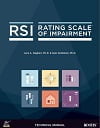
Rating Scales of Impairment [RSI]
A multi-informant behaviour rating scale that measures functional impairment across six life areas in children and youth
For Ages: 5 to 18 years
Format: Online via MHS Online Assessment Center+ (MAC+)
Length: 5-10 minutes administration time – Parent-completed or Teacher-completed.
Scoring: Online
Authors: Sam Goldstein, Ph.D. and Jack A. Naglieri, Ph.D
Printed Manuals
Physical printed manuals.
Online Forms, Reports, Kits & e-Manuals
All online resources including Forms, Reports, i-Admins, Kits and e-Manuals.
RSI Manual
RSI (13-18 years) Parent Online Report (each)
RSI (13-18 years) Teacher Online Report (each)
RSI (5-12 years) Parent Online Report (each)
RSI (5-12 years) Teacher Online Report (each)
The RSI is a multi-informant behaviour rating scale that measures functional impairment across six life areas in children and youth. When used in combination with symptoms measures, the RSI adds impairment information that may help complete the diagnostic picture. It also helps to highlight where functional impairment is most prominent so that interventions may be more effectively targeted. When used in group settings the RSI may help identify those who require additional assessment, or measure the effectiveness of intervention programs.
Sample Reports
Key Areas
- Determine if DSM-5/ICD-10 impairment criteria for a diagnosis are met by identifying specific areas where functioning is impacted.
- Develop targeted treatment plans and monitor progress by focusing on areas with the greatest impairment.
- Assess impairment more clearly by separating functional limitations from symptoms.
- Align with the World Health Organisation’s (WHO) functional impairment framework with scales that represent domains identified in the WHO’s International Classification of Functioning, Disability, and Health (ICF).
Scales
In order to provide age appropriate information, separate Parent and Teacher reports are available for both the RSI (ages 5-12 years) and RSI (ages 13-18 years).
- School/Work – reflects the child/youth’s level of impairment when acquiring and applying knowledge at school and/or work.
- Social – describes how impaired the child/youth is when interacting with others.
- Mobility – reflects the extent of the child/youth’s impairment when physically moving, such as running and kneeling.
- Domestic – reflects the child/youth’s level of impairment when helping around the house, including completing chores.
- Family – describes how impaired the child/youth is when interacting with family, such as communicating with family members and taking part in family activities.
- Self-Care – reflects the extent of the youth’s impairment in caring for themselves, including areas of feeding, dressing, and maintaining personal hygiene.
- Total Score – indicates the youth’s overall level of impairment.
What is Functional Impairment and why Measure it?
The precise definition of the term impairment varies across and within medical, mental health, and educational fields, but for this purpose, impairment is defined as a limitation resulting from a psychological, physical, or cognitive disorder that manifests as a reduced capability to meet the demands of life, such as physical mobility and self-care needs, family and social interaction expectations, domestic commitments, and school or work obligations.
Relationship Between the RSI and Other Measures
RSI and Adaptive Behaviour Measure
Median Correlation: -.54
The correlations between the RSI Total Score and the Adaptive Behavior Assessment System, Second Edition (ABASII; Harrison & Oakland, 2003) suggest that the two measures are related (given that they assess behaviour within similar domains). However, the strength of the relationship is moderate enough to suggest that the two are capturing different constructs. This finding supports the evidence in the research demonstrating important differences between the two constructs. Indeed, the main difference between adaptive behaviour and impairment lies in the distinction between skills and performance (Ditterline & Oakland, 2009). Whereas adaptive behaviour reflects the presence of skills learned to function in daily living, impairment reflects a deficit in using those skills. Thus, measures of impairment focus on the outcome of a behaviour rather than presence or absence of skills (Dumas et al.,2010; Gleason & Coster, 2012).
RSI and Symptoms-based Measure
Median Correlation: .29
The correlations between the RSI Total Score and the Conners Comprehensive Behavior Rating Scales (Conners CBRS; Conners, 2008) Symptom Scales suggest that impairment and symptoms are not strongly related. Such findings support the notion that symptoms and impairment are different constructs and need to be considered separately in making diagnoses (Barkley et al., 2006; Eriksen & Kress, 2005). In fact, a number of studies show that symptoms and impairment do not necessarily co-occur as individuals may meet the symptom criteria for a diagnosis without showing impairment or may show severe impairment without meeting the symptom criteria (Angold, Costello, Farmer, Burns, & Erkanli, 1999; Costello, Angold, & Keeler, 1999).
RSI and Intelligence Measure
Median Correlation: .59
The correlations between the RSI Total Score and the Wechsler Intelligence Scale for Children (WISC-IV; Wechsler, 2004) suggest that these measures are not related. These findings, which are in line with past research (Naglieri, Goldstein, & LeBuffe, 2010), indicate that children/youth who are diagnosed with psychological disorders may exhibit significant impairment in their overall functioning regardless of their level of intellectual ability.
RSI and Impairment Measure
Median Correlation: -.05
The correlations between the RSI Total Score and the Barkley Functional Impairment Scale for Children and Adolescents (BFISCA; Barkley, 2012) provide evidence of convergent validity in that the RSI is related to other measures of impairment. However, as expected given differences in item content, the correlations are not so strong as to suggest redundancy between the two measures.
Online administration in MHS Assessment Center + (MAC+)
Assessing online has never been easier with the new MHS Online Assessment Center +. Experience the new online platform designed with clinicians for clinicians to ensure the easiest, fastest and most accurate assessing possible!
Why use the RSI online?
- Save time – fast, easy and accurate administration with automated scoring
- Assess and score from anywhere – enjoy the convenience of viewing reports from your home, office or anywhere with an online connection
- Improve efficiency and accuracy – when items are absent, prompts appear to ensure information is not missed
- User friendly – easy to use interface for practitioners and respondents
- Gain information easily – email a link to the form directly to the respondent
- Tailored organisation – data can be customized to how you work
- Benefit from significant cost savings – don’t purchase paper forms in bulk ever again
View the full list of assessments available in the MHS Online Assessment Center + here.
 NZ
NZ




